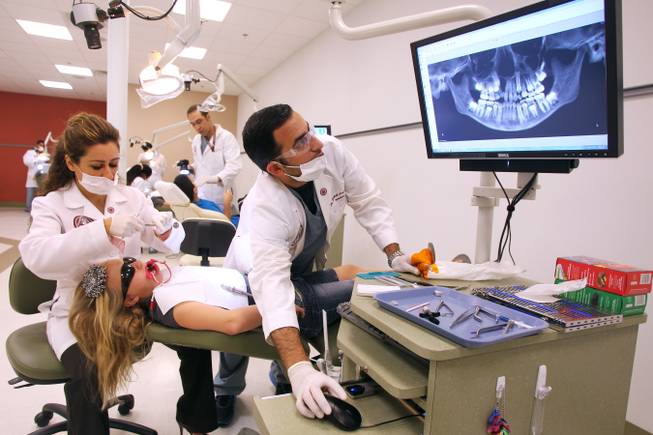
Resident Mickel Jourabchi adjusts an X-ray while Dr. Jaleh Pourhamidi prepares to work on patient Madison Szczublewski in the orthodontic clinic at Roseman University of Health Sciences in Henderson. Students gain practical experience working in the clinic.
Published Friday, April 26, 2013 | 12:10 p.m.
Updated Friday, April 26, 2013 | 2:41 p.m.
Roseman University of Health Sciences announced plans Friday to create the first M.D.-granting medical school in Southern Nevada.
Over the next several months, Roseman will begin the accreditation process for the medical school.
Although the timeline and details are still being worked out, the new Roseman University School of Medicine may begin enrolling students by 2015 or 2016.
Founded in 1999 by Renee Coffman and Harry Rosenberg, the private, nonprofit university in Henderson began as the Nevada College of Pharmacy, the first and still the only school of its kind in Nevada. Roseman, which is an amalgamation of the two founders' names, started with 38 students in a 900-square-foot office building in Henderson.
Over the next 13 years, Roseman expanded its operations significantly, even opening a pharmacy school in South Jordan, Utah. The university — which now enrolls 1,360 students in 400,000 square-feet of space in two states — currently offers degrees in business, dentistry, nursing and pharmacy.
Each time Roseman expanded, it did so to meet the health care needs of the Las Vegas community, said Coffman, the university’s president. With a new medical school, Roseman hopes to build a pipeline of doctors and physicians to serve Southern Nevada, she added.
"This represents the next jewel in the crown," Coffman said. "This is the next logical step in our development as a health sciences professional university. We're coming full circle."
Last week, Roseman's board of trustees authorized the university to apply for "applicant status" through the Liaison Committee on Medical Education, which is the accreditation body used by the University of Nevada School of Medicine. Roseman will send the first letter of intent by September, which would start a nearly two-year process to become an accredited medical school.
The university must submit plans for curricula, facilities, faculty and administration of the new medical school before it can begin enrolling students, Coffman said.
"We've got a lot more work ahead," she said. "(The letter) is really our first, little baby step."
Roseman is looking to start with about 60 students in its first year, and eventually expand to about 100 students, Coffman said. The university is now looking at a variety of facilities options, including constructing a new building on eight acres of undeveloped land at its Whitney Mesa campus, she said.
The school's courses and research will focus on the emerging field of geriatric medicine and public health, particularly disease prevention, Coffman said. Roseman will continue its unique educational model, which includes collaborative learning and graduating only top-level students.
"We have a track record of doing things right," Coffman said, adding Roseman's high standards will continue in its medical school.
A Roseman school of medicine won't be competing with existing and proposed medical schools in Nevada, Coffman said.
Roseman can co-exist and even complement the educational offerings at Touro University Nevada in Henderson, a private, nonprofit university that has an osteopathic – or D.O. granting –school of medicine, Coffman said.
Roseman can also complement the Nevada school of medicine, which currently graduates about 67 students annually, and possibly a new medical school at UNLV proposed by Regent Mark Doubrava, she added.
"We've got the capacity and we've got the applicants. There's room for both," Coffman said. "We'll offer a complementary choice for students. All of this is good for serving the needs of our community."
Coffman acknowledges that Southern Nevada currently has a shortage of medical residencies. Roseman is looking at offering nontraditional residencies – perhaps clinics serving the rural population – to help its students gain the experience needed to become successful doctors, she said.
"We think there are a lot of untapped resources," Coffman said. "Most residencies are in hospitals, but more and more of the demand is coming from outside (the hospital)."
CORRECTION: This version corrects the degree-granting programs now offered by Roseman. | (April 26, 2013)

Join the Discussion:
Check this out for a full explanation of our conversion to the LiveFyre commenting system and instructions on how to sign up for an account.
Full comments policy